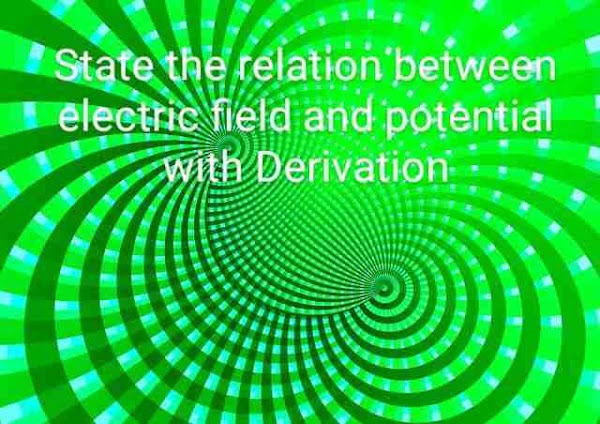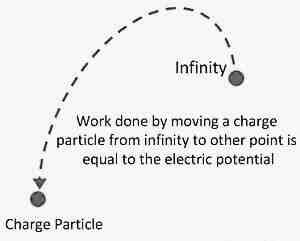State the relation between electric field and potential E = - dv/dx
Electrostatic is a concept of electric charge at rest. Let's elaborate it in more details.
As we know when the charge is moving then it is called electric current. But when the charge is at rest in one place and can not be moved until or unless external force can be applied then it is called electrostatic.
So here are the list that we will learn in this post.
- What is electric potential.
- What is electric field.
- Relation between electric field and potential.
- Derivation of relation between electric field and potential.
- Examples of electric field and potential.
So let's start with the meaning of electric potential.
What is electric potential in simple words?
Electric potential is basically referred as the value that we get after bringing a unit charge from one point to another point in an any electric field value.
In simple word, In those reasons where there is some electric field experiences. In that area, if we move a unit charge from one point to another point then work is done. So that amount of work is done per unit charge is called electric potential.
Please keep in mind while moving a unit charge in an area where electric field experiences. You have to maintain the velocity of unit charge. That means do that movement of unit charge in such a way that no any acceleration can be produced.
So we can say that this value of work done is equal to electric potential.
More depth concept of electric potential
In a concept of electric potential. We have observed that we always bring a unit charge. So what is that charge means? How we bring it from one point to another? To know all these underground questions. Please read further more.
To calculate the value of electric potential. We use the value of work done. Right!
Now, the question is, can we use a non unit charge. The answer is yes. We can use any amount of charge in electric potential.
Let's see how we move that charge from point to another point. So to do that we use a medium that can conduct electricity.
Suppose we have to bring a unit charge from one point to another. Now in that case here we are using a copper wire.
In case if we have to join two copper wire end to end then the electric potential at both the wire are equal.
What is an electric field simple definition?
In simple words electric field is the field or that area where some electric field lines are available due to some charged body present there. Or you can also say that those reason or area where there can be some force experienced or detected by another object.
For example, if a body comes closer to an area where some electric field present then that body experience some force which is called electric field.
Suppose you have an area which is rectangular in shape having some electric field. Because there is a charged body present.
Now, if we bring something that can experience electric field lines. That body will experience some force . So that reason are known as electric field.
In the above fig. There are some electric field lines present due to two charges one is positive and other negative.
Now, let's suppose we bring a magnetic compass near it. Then in that case the needle of the compass deflected. That means some force has experienced.
Please note that if we come closer to the charge the electric field force increases but while going down or far from the charge then electric field force decreases.
State the relation between electric field and potential
As we have discussed above about electric potential and electric field. In the above discussion we can easily observed that the concept of electric field will not be complete without electric potential. Because If there will be no any movement of test charge from one point to another then there will be no any generation of electric field.
So electric potential difference is necessary for the generation of electric field. About this little discussion we have conclude that there is something quite a relation exist between electric field and electric potential. means there is a quite connection exist between these two terms.
So this the only conceptual ways of looking a relation between electric field and potential. But now, lets see a mathematical relation between them.
Hence, the mathematical relation between electric field and electric potential is that electric field will always be equal to the negative gradient of electric potential. here gradient means nothing but a small length that a test charge travels from one point to another point.
E = −dv / dx
Please note that the relation between electric field and potential is also known as the relation between electric field and potential gradient. i.e, E = −dv / dx is same for relation between electric field and potential gradient.
lets understand the above relation in more depth ways.
In the above formula of the relation between electric field and potential. 'E' represents the electric field, minus sign represent that the particles moves in the direction of electric field intensity, 'dv' represents the small electric potential, 'dx' represents the potential gradients.
Derive the relation between electric field E and electric potential V.
To derive the relation between electric field and potential. We have to prove the relation between electric field and potential gradient. i.e,
E = - dv / dx
Now, let's consider a +q charge on a point P. From some distance say (x). Let's consider another charge q.
When we will trying to being this charge q towards +q. The magnetic field of +q exert a repulsive force in outward direction that can be denoted by E.
As we know for bringing the charge q we have to do work done.
Work done (w) = F. S
For small movement of charge by distance dx.
The work done dw = f. dx ---------(1)
As we know electric field (E) = f / q
F = E q ------------- (2)
Put the values of F in equation 1.
dw = Eq . dx
dw = q E dx cos 180
The value of angle is 180. Because the angle between electric field (E) and movement of charge (dx) is 180 degree. Means both are in opposite directions.
dw = q E dx cos 180
dw = - q E dx -------------- (3)
As we know the formula of electric potential is
V = w /q
For small distance dx.
dv = dw /dx
dw = q dv -------------(4)
From equation 3 and 4 we get,
-q E dx = q dv
- E dx = dv
E = - dv / dx
Hence, it has proven that the relation between electric field and potential gradient. i.e,
E = - dv / dx.
Related articles:-



